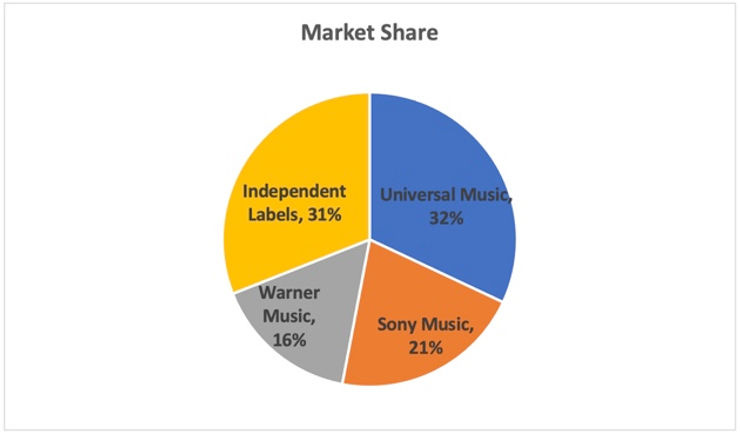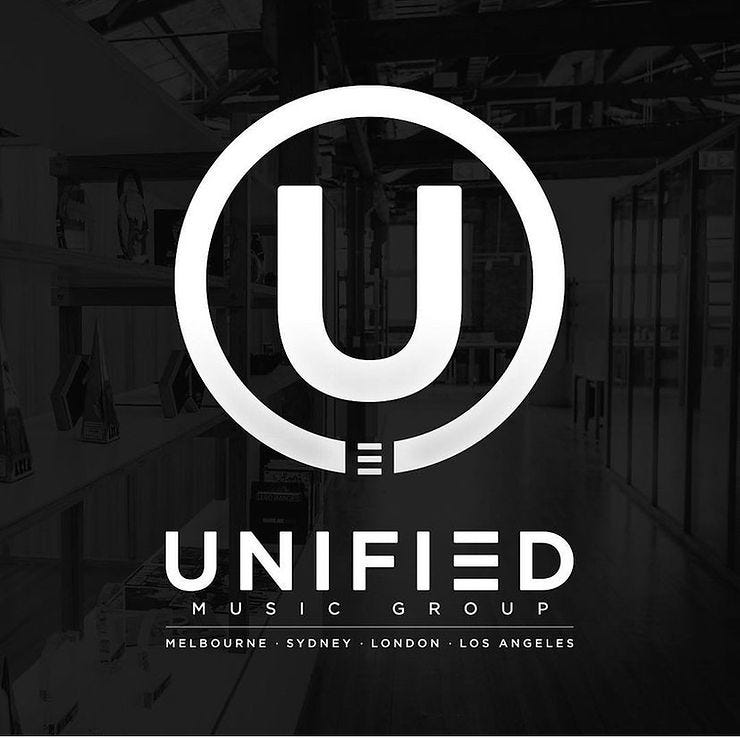Unified Music Group is an independent music company founded by Jaddan Comerford. Helping artists cultivate their True Fan base is the core focus of independent music companies. These passionate, high-spending fans contribute the majority of their artists’ income and allow them to make a living with a smaller, niche audience base.
The key to cultivating this passionate fan base is an authentic, tailored relationship with the artists. Jaddan’s unique approach is to develop the relationships and careers of the people around him. Being a True Fan of his artists and staff has helped him grow his artists, expand into new business lines to service them and expand his team.
The result is that his business has grown through perhaps the most intense technological disruption in any industry. Technology continues to change the industry. However, he is positioning his business to benefit by providing the services that his artists will need.
Index
1) Music Artists and the Creator Economy
2) The role of Record Companies
3) The Music Industry
4) Streaming
5) Streaming’s Impact on Music Artists
6) Independent Music Companies and True Fans
6) Jaddan’s Journey
7) Unified Music Group
8) Overcoming Disruption – Jaddan the True Fan
9) Technological Change - Still Thinking Ahead

Music Artists and the Creator Economy
I have been exploring the Creator Economy while profiling Feather, Clubhouse and Linktree. Besides famous social media celebrities, there is an increasing ability for a ‘middle class’ of creators to make a living out of their passion. The key to this is an authentic relationship with a base of ‘True Fans’.
Perhaps no group of creators represents this ideal more than the music artists represented by independent music companies. Thanks to technology, it has never been a more exciting time to be a music artist.
To explore this, I am grateful for the opportunity to catch up with Jaddan Comerford, founder of Unified Music Group. Unified Music Group is one of Australia’s largest independent music companies and has been nominated for Air Award’s 2021 Best Independent Music Label award. Jaddan himself is listed in The Power 50’s list of the most influential figures in Australian music.
To start, let’s explore what’s involved in making the music we love listening to and the role record companies play.
The Role of Record Companies
Segment Key Points
Creating a music album can be a lengthy and expensive process.
Music companies provide funding (record labels) and other services in exchange for ownership rights and a share of the royalties.
Artists may not see any income from their royalty rights given the length of time it takes to repay record labels for production costs. They are reliant on other income streams like merchandising and touring.
Creating a music album is a multi-step process. The creative aspect of being inspired and writing songs are only the beginning, as shown below:
The entire process can take a year and costs thousands to hundreds of thousands of dollars. Record companies facilitate this process by broadly offering the following services:
Financing – Typically done by the record label side of music companies. Record labels pay artists an ‘advance’ to cover the costs of producing and marketing the album.
Publishing\Administration - Registering the song's copyrights with the relevant bodies to receive royalties from the use of the music. There are 2 main copyrights. The first is the Master Recording which is the actual recording of the song owned by the record company and artist. The second is the copyright of the song itself (e.g. main melody, lyrics). This is owned by the music publisher and songwriters. Monitoring the use of the song across streaming platforms, radio etc., is an administrative process that the artist or songwriter may want to outsource.
Promotion and Distribution - Advertising campaigns and distribution. Includes getting the song visibility on streaming music platforms, radio and physical retail distribution.
Other Services – Examples include merchandising, touring support and artist management services.
Record companies provide these services in exchange for a cut of the royalty payments. In the case of record label deals, artists also give their labels ownership of the copyrights in addition to a share of the royalties. This is to compensate the labels for taking the risk of financing the costs of the album.
Artists take on average 14-25% of the royalties on digital and physical sales. The artist will then have to repay the label for the costs (advance, marketing costs etc.) out of her or his share of the royalties before receiving any further income.
It can take some time for the artist’s ‘debt’ to be paid back. Therefore, they are typically also reliant on other income sources like merchandise sales, touring\live events etc.
The music industry is finally emerging from a period of intense technological disruption, as detailed in the following sections.
The Music Industry
Segment Key Points
3 companies dominate the music industry with a 70% market share.
The industry has gone through one of the most intense digital disruptions of any industry.
After bottoming in 2014, the industry has grown for 6 consecutive years thanks to streaming.
One of the earliest known record deals was by the Victor Talking Machine Company in 1904 (it also produced record players). Today, the music industry is a concentrated industry, with the 3 ‘majors’ accounting for nearly 70% of recorded music sales in 2019. The ‘majors’ also own 60% of the publishing market. Independents hold the remaining market share as shown below:
Recorded Music market shares by Music & Copyright 2019
The invention of the CD by Sony and Phillips in the 1980s ushered in a golden age for the music industry. The peak came in 1999 when global record companies made $29 billion in revenue.
The advent of digital technologies like MP3s and filesharing severely disrupted the industry. Between 2001 and 2010, physical music sales declined by over 60% or $14 billion in annual revenue.
The industry only bottomed in 2014 before recording 6 consecutive years of growth, as seen below:
Global music industry revenues as shown in Statista
The industry has recovered much of its losses over the past 20 years. As the above chart shows, this is largely due to a certain technological innovation called streaming.
Streaming
Segment Key Points
The convenience of accessing an extensive library of songs on demand has reduced piracy and led the growth of the industry since 2014.
The industry outlook is positive as streaming subscribers are expected to more than double over the next 10 years.
Digital Streaming Platforms like Spotify and major record labels are clear beneficiaries.
When Spotify was founded in 2006, it was the height of online music piracy. Co-founder Daniel Ek had a goal to give people instant access to all the music in the world.
This was a new model for music. Rather than incurring the high costs of owning music outright, Spotify’s streaming model gives users access to a vast library of music on demand at an affordable monthly fee.
Music thus became a utility purchase, something one regularly used rather than a discretionary purchase. The increased convenience proved extremely popular with consumers, playing a key role in reducing the impact of piracy and bringing the industry back to growth.
In 2020, streaming accounted for over 60% of global music revenues and over 440 million subscribers. Streaming subscribers are projected to more than double to over 1 billion subscribers by 2030.
The future for the industry, therefore, looks promising. However, what does this mean for the various participants involved?
A broad indication of the revenue split from streaming looks as follows:
Rough revenue splits from streaming
While the above economics look favourable to the Digital Streaming Platforms like Spotify and the record labels, what will the impact be on the artists or creators?
Streaming’s Impact on Music Artists
Segment Key Points
Streaming royalty payment formulas preference artists with large audiences.
Low payout rates mean artists need millions of streams to receive material royalty payments.
Achieving millions of streams on Streaming Platforms requires getting onto their playlists which preference more vanilla, mainstream artists.
It is relatively easy for musicians to get paid from the sale of a CD album. This is because the sale can clearly be attributed to the artists who contributed to the album.
However, attribution is a much harder task under an access model like streaming. Here, a customer paying a $12 monthly subscription fee can choose to listen to a large number of songs from several different artists.
To simplify the process, a provider like Spotify simply aggregates the total number of music streams in a month and pays artists according to the number of times their songs are played that month.
The issue with this model is that it tends to benefit more mainstream, popular artists. For example, say you are a big fan of The Amity Affliction. Even if you listen to them exclusively for the month, most of your monthly subscription dollars will still go to popular artists like Taylor Swift, as she has a greater share of the streams that month.
Compounding this is the low payout rates per stream. As an example, artists used to earn roughly $7.50 per CD. This compares to $0.0032 per Spotify stream. In 2019, a British metalcore band While She Sleeps, sold t-shirts with text equating the sale of a single t-shirt to 5000 streams on Spotify!
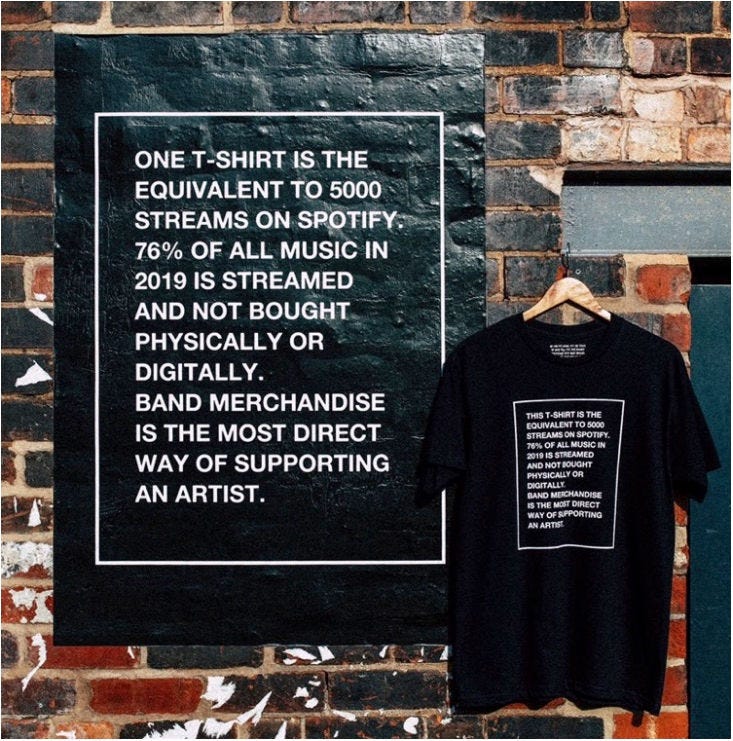
Achieving a large number of streams requires getting onto one of the platform’s popular playlists. Again, these playlists reward more vanilla, mainstream music.
Streaming, therefore, tends to preference more mainstream, popular artists typically associated with the major record labels. How can artists with more niche, intimate audiences make a living in the face of this? This is where independent music companies come in.
Independent Music Companies and True Fans
Segment Key Points
True Fans enable an artist to make a living out of a smaller audience of passionate fans.
These fans can account for 80% of the artist’s income. They require an authentic, tailored relationship.
Independent Music Companies provide artists with the economics, creative freedom and services to engage these True Fans.
In 2008, Kevin Kelly wrote an essay called 1000 True Fans. He introduced a concept where a creator only needed thousands of ‘True Fans’ rather than millions of fans to make a living.
‘True Fans’ are defined as fans who will buy anything the creator puts out. This includes purchasing the vinyl album, concert tickets, merchandise etc. Kevin described them as fans passionate enough to spend 1 day’s wages on the creator every year.
Cultivating these fans involves having a more authentic relationship with them. This includes:
Differentiated content tailored to them
A sense of community with like-minded individuals
An opportunity to interact with the creator and participate in the content creation.
The impact of these passionate fans can be profound. Some examples include:
In gaming, the top 1-2% of users drive 80% of revenues.
Only Fans top 0.08% creator Aella believes whales contribute 80% of a Webcam girl’s income. She shared her journey on a podcast with Creator Economy thought leader Li Jin. I believe that her courage, independence and creativity are traits that can be universally admired.
Compared to the majors, independent music labels tend to have:
More artist-friendly deals – Keeping more of the income allows the artist to earn a living from a smaller audience.
More creative freedom- This allows the artist to appeal to the tastes of a more niche, intimate audience.
A closer relationship with the music company – Includes services such as artist management, touring and merchandising. Merchandising can make up 25% of an artist’s take-home income, and live music touring is an even bigger market than streaming. For many musicians, streaming platforms were seen as merely a tool to promote merchandise and touring sales.
Independent music companies are therefore well-suited to help less mainstream artists engage these passionate fans.
A Deloitte survey in 2020 found that Independent Record Labels in Australia grew revenue by 18% over the past 4 years.
One of these labels is Unified Music Group. It emerged from Boomtown Records, a record label founded by a then 17-year-old Jaddan Comerford out of his bedroom.
Jaddan’s Journey
Segment Key Points
Jaddan drew inspiration for his music career from punk rock label Epitaph Records.
His parents’ entrepreneurship journey helped form his belief in the importance of relationships and building careers. These beliefs would come to define his own entrepreneurship journey.
17-year-old Jaddan founded Boomtown records in 2001.
Even at that young age, Jaddan knew 2 things. He wanted a career in the music industry, and he wanted to be an entrepreneur.
Jaddan’s passion for music began when his brother bought him a copy of punk rock band The Offspring’s 1994 album Smash. This became the highest selling independent album until Adele.

The band’s record label was Epitaph records. Epitaph Records was founded by Brett Gurewitz, then lead guitarist for his punk rock band Bad Religion. Jaddan bought several other albums from Epitaph. Along with a passion for the genre, Epitaph showed him that a great brand had the power to influence what he listened to. He then realised that music could be a career when he discovered his next-door neighbour was well-known composer David Hirschfelder.
His interest in entrepreneurship came from his parents. Initially, his dad was a plumber, and his mum was a nurse. To put their 3 children through St Kevins, a prestigious private school in Melbourne, they became Bakers Delight franchisees.
What’s interesting is that they sold their franchise interests once his younger brother graduated. His father went back to plumbing and is currently a plumbing teacher!
I felt this demonstrated the lengths his parents would go to for relationships they cared about – and perhaps the biggest gift would be to support their development. This principle of relationships and development would become the defining feature of Jaddan’s entrepreneurship journey.
At 17 years old, and with $400 from the sale of his clarinet, Jaddan started his first record label Boomtown Records, in 2001.
Unified Music Group
Segment Key Points
Unified Music grew by expanding into other services which its artists needed, such as artist management, merchandising and touring.
This was a considered expansion, driven by demand from their existing artist clients.
This allowed the business to grow through intense technological industry disruption.
The idea for Boomtown Records came from a bandmate’s dad who worked for Shock Records.
At the time, Shock Records was Australia’s largest independent record distributor. It focused on punk and alternative rock. This genre boomed in the 1990s thanks to hit albums like The Offspring’s Smash, which Shock Records distributed in Australia.
It was therefore a great fit for Jaddan’s aspiring punk record and metalcore label. It also was a powerful distribution partner, which gave his label credibility with the artists.
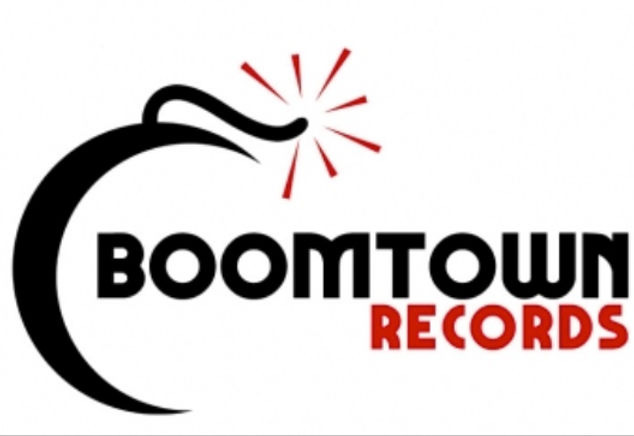
Boomtown’s first signing was punk band Wishful Thinking in 2002. This was followed by other bands like Behind Crimson Eyes, The Getaway and The Amity Affliction.
Beginning the journey in 2001 meant that Boomtown had a fresh start and still managed to grow while much of the music industry was experiencing challenges from ever-decreasing CD sales.
However, Boomtown began to feel the impact from 2008-2010. In response, Jaddan expanded the business by providing other services that artists need, such as artist management, merchandising etc. He brought all these businesses under the Unified Music Group name in 2011.
Jaddan’s team consisted of around 10 people then. 10 years later, Unified Music Group has over 60 staff across Australia, UK and the US. Its services are grouped across the following divisions:
Recorded Music – Mainly consists of their Record Label UNFD. This is the evolution of Boomtown Records.
Artist Management - An artist manager acts as a musician’s professional representative and advisor. The manager represents the artists on contract negotiations, advise on crafting their brand image, introduce them to producers, songwriters etc. It is therefore a very intimate and aligned relationship with the artist.
Merchandise - Mainly consists of their e-commerce sales of artist merchandise. Their 24Hundered brand was one of the first ARIA approved e-commerce platforms in Australia.
Events and Touring - The organisation of tours and events under their Red Hill Entertainment brand. Notable events include the UNIFY Gathering and Land of Plenty festivals.
Investments – Investments in private businesses such as Mr Yum (previously profiled), Muso (music tech) and Sense of Self (body positivity and wellness). This reflects Jaddan’s aim to develop careers, including guiding entrepreneurs on their journeys.
By considered expansion into additional services which his own artists need, Jaddan has successfully steered his business through one of the most intense technological industry disruptions in any industry.
His strategic and management insight did not come from an MBA course or experience working in a large corporation. Instead, it stemmed from his passion for developing relationships and careers. This made him a True Fan of the people around him.
Overcoming Disruption – Jaddan the True Fan
Segment Key Points
Jaddan’s unique approach is the development of the relationships and careers of the people around him.
The resulting close relationships with his artists allowed Unified Music Group’s expansion into additional business lines, offsetting disruption.
It also resulted in long tenures in his senior management team. This continuity and trust allowed him to scale his workforce 6x over 10 years without impacting culture.
With Jaddan Comerford at their Richmond office in Melbourne. I am wearing a jumper featuring The Amity Affliction, which has nearly a 15-year relationship with Jaddan.
A True Fan is someone who will go to great lengths to show their support and develop a relationship with an artist.
In many ways, this describes Jaddan’s unique approach with both artists and staff. He has a strong belief in the value of relationships and a passion for developing and growing the careers of the people around him.
Some key artist successes he talked about include:
Supporting Vance Joy, an artist he co-manages with his wife Rachael, at a Glastonbury festival in England. Playing in front of thousands of fans in the rain, he describes the emotional impact of holding his wife’s hand while seeing an Aussie flag being displayed proudly in the crowd. Vane Joy’s breakthrough song Rip Tide saw global streaming success and was covered by Taylor Swift, who invited him to support her during her world tour.
Seeing The Amity Affliction perform at the Rod Laver Arena (roughly 15,000 seating capacity). They were the first Australian heavy metal band to play at such a large arena. The Amity Affliction will go on to have 4 consecutive #1 albums. Only 5 Aussie bands have done this, including INXS and Powderfinger.
Artist Manager Nick Yates guiding Violent Soho’s album Hungry Ghost to going gold. Jaddan celebrates the fact that this was done largely without his input.
I noted how he highlighted the importance of relationships while highlighting each of these wins. These relationships with his artists formed the basis of his expansion into additional business lines:
Artist Management – Expanded into this in 2004 when Behind Crimson Eyes ran out of t-shirts while on tour in Perth. Jaddan had some shirts printed in Melbourne and personally delivered these to Perth. The band then asked him to be their manager.
Merchandising - E-commerce business, 24Hundred, emerged out of an attempt to sell excess merchandise online to fund The Amity Affliction’s flights for their first EU tour.
Entry into the US - Driven by Vance Joy’s contract negotiation with Atlantic Records. Jaddan and Rachael then relocated to New York to build Vance Joy’s overseas presence.
Jaddan carries his belief in relationships and career development to his staff as well. Senior management team members have long tenures. Examples are:
Luke Logemann – Runs the record label business. He began his journey with Jaddan in 2006. This includes moving into his parents’ house for a short period!
Matt Rogers – Chief Operating Officer who runs the business day-to-day. Matt has been with Unified Music Group for over 8 years.
Rachael Tulloch - Co-owner and General Manager. Rachael has been with Unified Music Group for over 8 years.

These long tenures promote trust and have allowed Jaddan to grow his team by 6x over 10 years while maintaining Unified Music Group’s culture.
I had the opportunity to meet their broader team during a Mental Health and Aboriginal Rights awareness run in Melbourne.
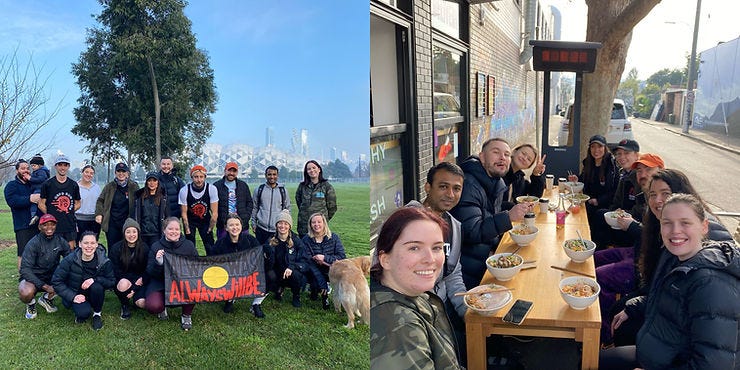
I found the team to be passionate about their mission to improve the lives of artists. There was an awareness of the responsibility and trust the artists placed in them.
I also spoke to one of their artists who was at the event. She had positive feedback on Unified Music Group’s service levels and the access she has with the senior management team, some of whom were present at the event.
The result is that Jaddan has grown his business well ahead of an industry dealing with technological disruption, as shown below:

2020 marks the 6th consecutive year of industry growth. The scale of streaming is such that it is beginning to be material for artist earnings. With streaming subscribers expected to more than double over the next 10 years, the outlook has never been stronger for Unified Music Group.
Rather than sitting back and finally claiming victory, Jaddan continues to think ahead.
Continued Technological Change - Still Thinking Ahead
Segment Key Points
Technological change is turning music into an asset class and allowing a direct relationship between the artist and fans.
This may cause artists to place a high value on their royalty rights and raise capital from investors based on them, just like typical founders.
Unified Music Group is well-positioned to support this trend thanks to the numerous services it can provide artists to grow the value of their royalty stream.
Streaming has brought the industry back to growth and is beginning to be a material source of income for artists. It has also made music into a utility purchase with stable, recurring income. This is turning music into its own asset class.
The result is that increasingly, musicians now have a reason to care about their royalty rights rather than signing them away for a record deal.
Once again, Jaddan is considering ways to support his artists through this industry change. He sees a future where musicians become entrepreneurs, similar to founders in startups.
This means they will have the ability to raise capital based on selling equity stakes in their copyrights. Retaining an ownership stake incentivises artists to promote and grow their streaming royalty income. It turns them from a client of the music company into a highly incentivised partner.
With services like artist management, merchandising and marketing, Unified Music Group is well-positioned to help musicians grow the value of their ownership stakes.
Unified Music Group will therefore stay relevant in the face of continued technological change as the music industry moves to promote direct relationships between musicians and their fans. Examples of this include:
Spotify’s intention to introduce tipping and merchandise sales on their platform.
NFTs which allow fans to directly fund and interact with musicians.
By thinking ahead, Jaddan is positioning Unified Music Group to navigate the next 10 years of technological change the way he has always managed his business – by being his artists’ True Fan.




